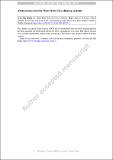Abstracting mobility flows from bike-sharing systems
Author(s)
Kon, Fabio; Ferreira, Éderson C.; de Souza, Higor A.; Duarte, Fábio; Santi, Paolo; Ratti, Carlo; ... Show more Show less
Download12469_2020_259_ReferencePDF.pdf (14.99Mb)
Publisher Policy
Publisher Policy
Article is made available in accordance with the publisher's policy and may be subject to US copyright law. Please refer to the publisher's site for terms of use.
Terms of use
Metadata
Show full item recordAbstract
Abstract
Bicycling has grown significantly in the past ten years. In some regions, the implementation of large-scale bike-sharing systems and improved cycling infrastructure are two of the factors enabling this growth. An increase in non-motorized modes of transportation makes our cities more human, decreases pollution, traffic, and improves quality of life. In many cities around the world, urban planners and policymakers are looking at cycling as a sustainable way of improving urban mobility. Although bike-sharing systems generate abundant data about their users’ travel habits, most cities still rely on traditional tools and methods for planning and policy-making. Recent technological advances enable the collection and analysis of large amounts of data about urban mobility, which can serve as a solid basis for evidence-based policy-making. In this paper, we introduce a novel analytical method that can be used to process millions of bike-sharing trips and analyze bike-sharing mobility, abstracting relevant mobility flows across specific urban areas. Backed by a visualization platform, this method provides a comprehensive set of analytical tools to support public authorities in making data-driven policy and planning decisions. This paper illustrates the use of the method with a case study of the Greater Boston bike-sharing system and, as a result, presents new findings about that particular system. Finally, an assessment with expert users showed that this method and tool were considered very useful, relatively easy to use and that they intend to adopt the tool in the near future.
Date issued
2021-03-16Department
Massachusetts Institute of Technology. Department of Urban Studies and Planning; Senseable City LaboratoryPublisher
Springer Berlin Heidelberg
Citation
Kon, Fabio, Ferreira, Éderson C., de Souza, Higor A., Duarte, Fábio, Santi, Paolo et al. 2021. "Abstracting mobility flows from bike-sharing systems."
Version: Author's final manuscript